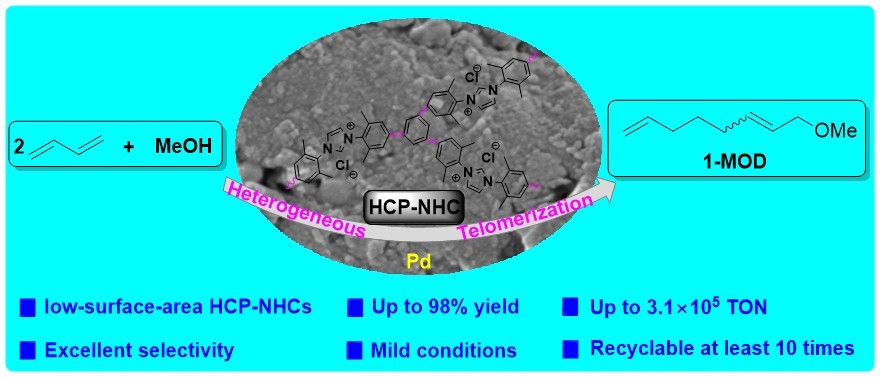Researchers Achieve Highly Efficient Heterogeneous Telomerization of 1,3-butadiene with Methanol
To promote the high-quality development of high-end polyolefin, the development of highly efficient heterogeneous catalysts for the telomerization of 1,3-butadiene and methanol to the linear product (1-methoxy-2,7-octadiene, 1-MOD) has received considerable attention. However, current heterogeneous catalysts suffer from low catalytic activity, low selectivity, and poor stability. Therefore, achieving high stability and efficient telomerization has become an urgent issue that needs to be addressed in this field.
Based on the Scholl Reaction, a kind of low-surface-area carbene functionalized hypercrosslinked polymers was developed by YANG Yong's research group from the Qingdao Institute of Bioenergy and Bioprocess Technology of the Chinese Academy of Sciences.
The study was published in Chemical Engineering Journal on February 21.
Using this hypercrosslinked polymer as a ligand in the telomerization of 1,3-butadiene and methanol, significantly improved activity (TON up to 3.1×105) and selectivity (98.5%) were achieved.
In particular, the heterogeneous catalyst (Pd@HCP-NHC-3) could be prepared in situ during the telomerization process and reused at least 10 times without any significant loss of activity and selectivity.
Studies on the relationship between the structure of the catalyst and its activity have shown that the modification of the Pd coordination environment by diene ligands, such as 1,3-butadiene or 1-MOD, together with a low-surface-area hypercrosslinked polymer framework, leads to a synergistic effect that enhances the performance of heterogeneous telomerization catalysts.
This novel heterogeneous catalyst has demonstrated high stability, excellent activity and selectivity, and low palladium loss, making it a potential solution to the technical challenges faced by current heterogeneous telomerization catalysts.

Highly efficient heterogeneous telomerization of 1,3-butadiene with methanol
(Image/Text by YU Bo)
Contact:
KONG Fengru
Qingdao Institute of Bioenergy and Bioprocess Technology, Chinese Academy of Sciences
Tel: 86-532-58261072
E-mail: kongfr@qibebt.ac.cn